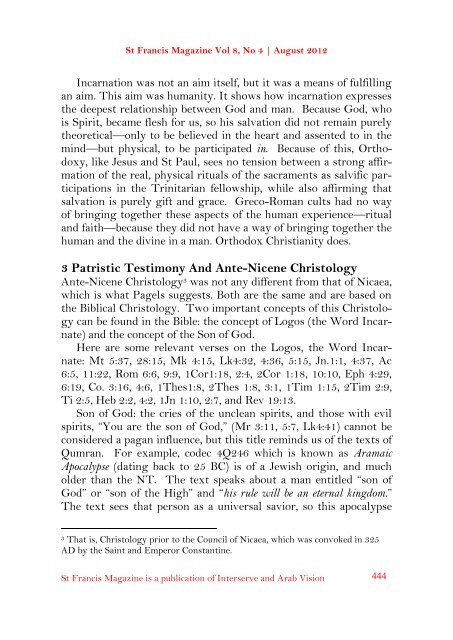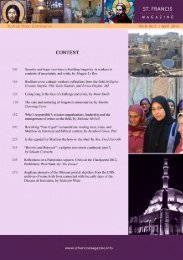download the pdf - St.Francis Magazine
download the pdf - St.Francis Magazine
download the pdf - St.Francis Magazine
Create successful ePaper yourself
Turn your PDF publications into a flip-book with our unique Google optimized e-Paper software.
<strong>St</strong> <strong>Francis</strong> <strong>Magazine</strong> Vol 8, No 4 | August 2012<br />
Incarnation was not an aim itself, but it was a means of fulfilling<br />
an aim. This aim was humanity. It shows how incarnation expresses<br />
<strong>the</strong> deepest relationship between God and man. Because God, who<br />
is Spirit, became flesh for us, so his salvation did not remain purely<br />
<strong>the</strong>oretical—only to be believed in <strong>the</strong> heart and assented to in <strong>the</strong><br />
mind—but physical, to be participated in. Because of this, Orthodoxy,<br />
like Jesus and <strong>St</strong> Paul, sees no tension between a strong affirmation<br />
of <strong>the</strong> real, physical rituals of <strong>the</strong> sacraments as salvific participations<br />
in <strong>the</strong> Trinitarian fellowship, while also affirming that<br />
salvation is purely gift and grace. Greco-Roman cults had no way<br />
of bringing toge<strong>the</strong>r <strong>the</strong>se aspects of <strong>the</strong> human experience—ritual<br />
and faith—because <strong>the</strong>y did not have a way of bringing toge<strong>the</strong>r <strong>the</strong><br />
human and <strong>the</strong> divine in a man. Orthodox Christianity does.<br />
3 Patristic Testimony And Ante-Nicene Christology<br />
Ante-Nicene Christology 3 was not any different from that of Nicaea,<br />
which is what Pagels suggests. Both are <strong>the</strong> same and are based on<br />
<strong>the</strong> Biblical Christology. Two important concepts of this Christology<br />
can be found in <strong>the</strong> Bible: <strong>the</strong> concept of Logos (<strong>the</strong> Word Incarnate)<br />
and <strong>the</strong> concept of <strong>the</strong> Son of God.<br />
Here are some relevant verses on <strong>the</strong> Logos, <strong>the</strong> Word Incarnate:<br />
Mt 5:37, 28:15, Mk 4:15, Lk4:32, 4:36, 5:15, Jn.1:1, 4:37, Ac<br />
6:5, 11:22, Rom 6:6, 9:9, 1Cor1:18, 2:4, 2Cor 1:18, 10:10, Eph 4:29,<br />
6:19, Co. 3:16, 4:6, 1Thes1:8, 2Thes 1:8, 3:1, 1Tim 1:15, 2Tim 2:9,<br />
Ti 2:5, Heb 2:2, 4:2, 1Jn 1:10, 2:7, and Rev 19:13.<br />
Son of God: <strong>the</strong> cries of <strong>the</strong> unclean spirits, and those with evil<br />
spirits, “You are <strong>the</strong> son of God,” (Mr 3:11, 5:7, Lk4:41) cannot be<br />
considered a pagan influence, but this title reminds us of <strong>the</strong> texts of<br />
Qumran. For example, codec 4Q246 which is known as Aramaic<br />
Apocalypse (dating back to 25 BC) is of a Jewish origin, and much<br />
older than <strong>the</strong> NT. The text speaks about a man entitled “son of<br />
God” or “son of <strong>the</strong> High” and “his rule will be an eternal kingdom.”<br />
The text sees that person as a universal savior, so this apocalypse<br />
3 That is, Christology prior to <strong>the</strong> Council of Nicaea, which was convoked in 325<br />
AD by <strong>the</strong> Saint and Emperor Constantine.<br />
<strong>St</strong> <strong>Francis</strong> <strong>Magazine</strong> is a publication of Interserve and Arab Vision 444







![Reflections on Surah Fatiha and the Lord's Prayer[1] - St.Francis ...](https://img.yumpu.com/49377951/1/184x260/reflections-on-surah-fatiha-and-the-lords-prayer1-stfrancis-.jpg?quality=85)









